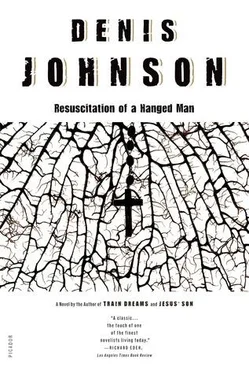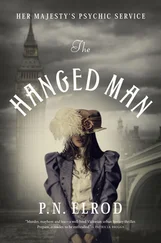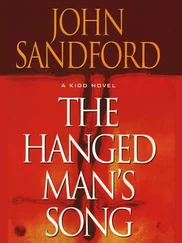English had acquired a wonderful new sensitivity that disintegrated walls. As the sun rose over the little towns, he heard the chiropractors crying out. He heard the bankers’ feet searching for their slippers, the schoolteachers cursing in their bathrooms. Meanwhile the Georgian had his hand up under the skirt of his new friend. “When did you get out of the Air Force?” she asked him. “The second I went AWOL. I turned Communist,” he said. “I was gonna say I bet you’re political,” she said, and he told her before he kissed her again, “I’m a Trotskyite. I’m gone take to the hills till I overthrow the government.”
The rain had stopped and it was sunny and hot, but it was very wet. Two beautiful, almost silver aluminum tank trucks ahead created a tunnel of plunging evergreens, the dirty mist of standing rainwater exploding behind them, nature stirred by their passage in a way that made it seem man is very powerful indeed.
English showed Jerry Twinbrook one of the drawings from Twinbrook’s own sketch pad.
“Okay, your fish is definitely a fish, right—”
“Yeah—”
“Not a very good fish—”
“No—”
“—but it’s definitely a fish. But what is that behind it? Is that a radio, is that a ghost—”
“It’s a clock—”
“—is that a ghost of a radio?”
“It’s a clock with a cup on it. What do you know? You don’t know anything about paintings—”
“I know something about clocks—”
“—not a fucking thing about paintings—”
“I know about clocks—”
“You know what you like, you—”
“I can recognize a clock, and I look at that and I see a ghost of a radio, because you’re afraid of the clock the way it really is. That’s what it’s all about, isn’t it—”
“You’re the one who’s afraid of time.”
“—it’s all about fear.”
“‘Fear’ or ‘feet’?”
“Come on! Don’t back off on me, man, tell me the truth — you’re blurring these things. The reason you don’t paint them the way it really looks is because you’re afraid of it the way it really looks.”
Twinbrook said, “Yeah. I think this is the way they really look, though. Don’t you know the lessons of love? Nothing is what you see.”
“Nothing is what I see,” English said.
“As long as one slave walks the earth, you cannot be free. As long as one prisoner remains, you yourself are in chains. That’s what Jesus was saying — when you visited the imprisoned, when you ministered to the dying, you did it to me. He’s one of them, until the last is free. And so are you. So am I.”
“That’s what Simone Weil was doing? Starving with the starved?”
“And Christ on the cross with the thieves, and St. Paul languishing in jail.”
“What about Joan of Arc?”
“Joan of Arc,” Twinbrook said, “was a self-signifying slut.”
The others around him had found their stops and cleared out by now. The bus driver must have realized that English was talking to himself, because at the next stop he came back to interrupt.
“I’m perfectly okay,” English said.
“Are you aware you’re raving out loud so everybody can hear?”
“It’s okay. I’m cultivating it.”
“You’re cultivating it?”
“I’m letting it happen. I’m in control. It’s cool.”
“I hope it is. I hope it is.”
“I’m learning things,” English told him.
“Not so loud, huh? Okay?”
“Okay.”
“Okeydokey?”
“Okeydokey, all reet, and ten four,” English promised.
He had to change buses in Boston. While he was waiting in the Boston depot, he called the highway patrol and instructed them anonymously how to find Jerry Twinbrook’s corpse. Then he got on the bus heading down the Cape to Provincetown.
Twinbrook wasn’t on this bus. English looked everywhere, but he was gone. That was par, it seemed to English — everybody was backing off on him, even the people who weren’t exactly real.
It took half an hour to get across the Sagamore Bridge. The Cape highway was completely choked with the season’s arrivals. Two hours later, after the stop in Hyannis, the bus swung around a hitchhiker chasing a stopped car and crawled past a rest area where a team of exhausted bicyclists had draped themselves on the picnic tables. They’d all reached the lower Cape, where the four-lane road narrowed down to two, and where a white sign by the road beseeched those who passed and where English was thinking about the woods again, and about Gerald Twinbrook laid out at the end of his own road. That strange naked moment, he thought. That is my slot, my path. Not Success, not Romance. Nothing easy or even anything that can be understood. I saw the goddess: dead, and in the form of a man with his eyes pecked out.
DO NOT
DRIVE IN
BREAKDOWN
LANE
Many of the feelings I’ve been having lately, breaking down crying when alone, the sense of a cloud between me and God, the intuition that now, behind the cloud, is the time of faith—
these could be a madman’s feelings, a maniac’s—
He stood in Leanna’s living room — bedroom, bent over her desk, adding to his note. He was going to finish this thing, he had something to say. But he didn’t like the way he smelled — he was rank with bus station grime and the sweat of fear and pilgrimages. He had a dizzying impulse to slash her water bed with a knife and bathe in the flood. Also, it wasn’t right that his words turned from blue to black after the opening thought.
I’m going through some unspecified change—
I’ve never really known where to find the slot marked LOVE — or at least ROMANCE — it’s not there for me, I realize.
You’d say everything was just a coincidence. There are no coincidences to a faithful person, a person of faith, a knight of faith.
He opened the cash box. A ring of keys, rubber bands, and two bullets of a massive caliber. Tens, twenties, singles, fives — over a hundred bucks. His note wasn’t finished. But he wanted to copy it from the start on one of these good sheets of paper, using just the black pen.
I remember thinking on my last birthday: Thirty-four, and my life hasn’t even started yet. I wasn’t yet born, couldn’t be until — until what? Until someone told me my real name, or something like that.
I’m a private detective and I’m living out a private mystery … Leanna, the mystery is the Mystery.
He rummaged through her drawers for an envelope and came across her.44 revolver. Altogether the weapon was well over a foot long and must have weighed, he judged by hefting it, nearly five pounds. It wasn’t loaded. He added to its weight a little bit by putting the two bullets into the cylinder.
He stood in the room with the gun raised, sighting down the barrel at the water bed.
Now, what if you were home? he asked Leanna.
He’d followed everything out faithfully. He’d been true to every impulse. What was he being asked to do? Immediately he thought of taking this gun and shooting the Bishop, but that was crazy.
On the other hand — would God ask for anything sane? Did He come to Elijah and say, Go, secure a respectable position and wear out your days in the chores of it? Did His strange monstrous finger guide a person toward the round of events that wears us down and evens us out until even the meanest is presentable, if wrinkled and feeble? Or did it point straight to an earthquake and say, Don’t you dare come back until you’ve died.
Leanna had a walk-in closet: into which English walked.
He raised a gentle clatter among the hangers by rifling through her wardrobe. It wasn’t too extensive, just about right, he thought, for a mannish dyke. Dust coated the makeup items on her dresser. English laid the revolver among them next to its own reflection in the mirror. He found a blue purse and emptied his pockets into it.
Читать дальше












